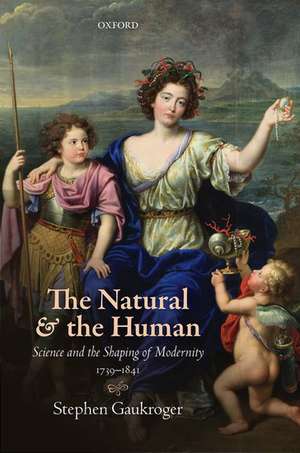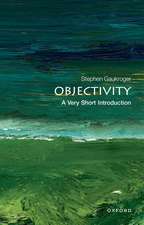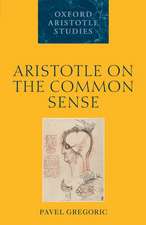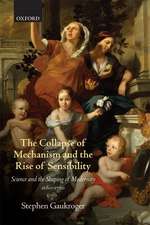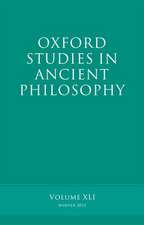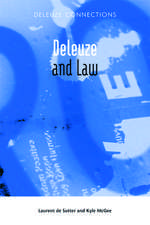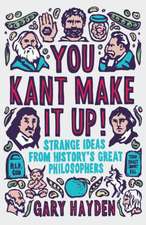The Natural and the Human: Science and the Shaping of Modernity, 1739-1841: Science and the Shaping of Modernity
Autor Stephen Gaukrogeren Limba Engleză Hardback – 21 ian 2016
| Toate formatele și edițiile | Preț | Express |
|---|---|---|
| Paperback (1) | 230.58 lei 31-38 zile | +71.41 lei 6-12 zile |
| OUP OXFORD – 8 mar 2018 | 230.58 lei 31-38 zile | +71.41 lei 6-12 zile |
| Hardback (1) | 374.59 lei 31-38 zile | |
| OUP OXFORD – 21 ian 2016 | 374.59 lei 31-38 zile |
Preț: 374.59 lei
Preț vechi: 478.94 lei
-22% Nou
Puncte Express: 562
Preț estimativ în valută:
71.69€ • 74.75$ • 59.58£
71.69€ • 74.75$ • 59.58£
Carte tipărită la comandă
Livrare economică 10-17 martie
Preluare comenzi: 021 569.72.76
Specificații
ISBN-13: 9780198757634
ISBN-10: 0198757638
Pagini: 412
Dimensiuni: 162 x 240 x 28 mm
Greutate: 0.7 kg
Editura: OUP OXFORD
Colecția OUP Oxford
Seria Science and the Shaping of Modernity
Locul publicării:Oxford, United Kingdom
ISBN-10: 0198757638
Pagini: 412
Dimensiuni: 162 x 240 x 28 mm
Greutate: 0.7 kg
Editura: OUP OXFORD
Colecția OUP Oxford
Seria Science and the Shaping of Modernity
Locul publicării:Oxford, United Kingdom
Recenzii
In the first volume of his series to date (whose publication has spanned the decade 2006 to 2016), the author studied the period from 1210 to 1685, The Emergence of a Scientific Culture. His second volume overlapped the first, covering 1680 to 1760, The Collapse of Mechanism and the Rise of Sensibility. Together, these three books represent one of the landmark achievements in the field of history of science, and represent essential reading for a wide range of disciplines. A tremendous intellectual achievement. We all eagerly await the fourth volume, dealing with science and civilisation from about 1840 to 1940.
The Natural and the Human...presents a fascinating, astonishingly broad-based...overview of the emergence of the human sciences, which contributes to large discussions about Western culture.
The Natural and the Human, and Stephen Gaukroger's endeavor as a whole, raise once again many of the crucial methodological and ideological issues that are at the heart of doing intellectual history and the history of science
This book also has any number of useful, clear, synthetic side discussions, which belong to the general narrative but are somehow synthetic to themselves...this is again an impressive work, which perhaps is best read with its predecessor The Collapse of Mechanism and the Rise of Sensibility.
The prose is dense, but it is also extremely rewarding. The manifest strength of the analysis is that it moves so seamlessly between different intellectual spheres and disciplines...what Gaukroger achieves so brilliantly is to make clear that such innovations should be included in any attempt to truly understand how science was consolidated as an inescapable intellectual mode.
The scope of Gaukroger's project is immense. His scholarship draws on primary sources in at least four languages, and extensive secondary commentary, much of it recent. Gaukroger typically proceeds by a focus on a few key individuals and their works as central nodes in developing this story--Descartes, Newton, Leibniz, Locke, Hume, Diderot, Gibbon, Mandeville, Herder, Kant, Hegel, Strauss, Feuerbach--around which he weaves a larger narrative The copious footnotes (yes, footnotes, not annoying endnotes), typically citing the most recent scholarship and the key primary sources relevant to the discussion, direct the reader to more detailed studies which he has synthesized in depth I find it deeply refreshing to read the effort of a single individual with wide and deep scholarly learning to deal with such a complex array of issues from a coherent organizing perspective.
This compelling and erudite book examines the emergence of the human sciences in the eighteenth and early nineteenth centuries and explores the rise of sensibility in studies of human nature and behavior.
The Natural and the Human...presents a fascinating, astonishingly broad-based...overview of the emergence of the human sciences, which contributes to large discussions about Western culture.
The Natural and the Human, and Stephen Gaukroger's endeavor as a whole, raise once again many of the crucial methodological and ideological issues that are at the heart of doing intellectual history and the history of science
This book also has any number of useful, clear, synthetic side discussions, which belong to the general narrative but are somehow synthetic to themselves...this is again an impressive work, which perhaps is best read with its predecessor The Collapse of Mechanism and the Rise of Sensibility.
The prose is dense, but it is also extremely rewarding. The manifest strength of the analysis is that it moves so seamlessly between different intellectual spheres and disciplines...what Gaukroger achieves so brilliantly is to make clear that such innovations should be included in any attempt to truly understand how science was consolidated as an inescapable intellectual mode.
The scope of Gaukroger's project is immense. His scholarship draws on primary sources in at least four languages, and extensive secondary commentary, much of it recent. Gaukroger typically proceeds by a focus on a few key individuals and their works as central nodes in developing this story--Descartes, Newton, Leibniz, Locke, Hume, Diderot, Gibbon, Mandeville, Herder, Kant, Hegel, Strauss, Feuerbach--around which he weaves a larger narrative The copious footnotes (yes, footnotes, not annoying endnotes), typically citing the most recent scholarship and the key primary sources relevant to the discussion, direct the reader to more detailed studies which he has synthesized in depth I find it deeply refreshing to read the effort of a single individual with wide and deep scholarly learning to deal with such a complex array of issues from a coherent organizing perspective.
This compelling and erudite book examines the emergence of the human sciences in the eighteenth and early nineteenth centuries and explores the rise of sensibility in studies of human nature and behavior.
Notă biografică
Stephen Gaukroger, who was educated at London and Cambridge Universities, is Emeritus Professor of History of Philosophy and History of Science at the University of Sydney. He is author of nine books in the history of science and history of philosophy, including an intellectual biography of Descartes, as well as translations of the works of Descartes and Arnauld. The Emergence of a Scientific Culture: Science and the Shaping of Modernity, 1210-1685, was published in 2006, and The Collapse of Mechanism and the Rise of Sensibility: Science and the Shaping of Modernity, 1680-1760, was published in 2010. His work has been translated into Arabic, Chinese, French, German, Italian, Portuguese, Russian, and Serbian.
